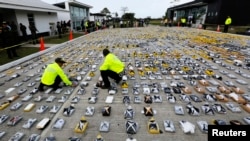Even though the government and FARC rebels signed a cease-fire accord Thurdsay, thousands of Colombians will be forced to flee their homes each year because of violence by other armed groups, the U.N. refugee agency said.
Colombia's government and rebels from the Revolutionary Armed Forces of Colombia signed the agreement to end hostilities, bringing them close to ending Latin America's longest-running insurgency. The half century of war has killed more than 200,000 people.
But powerful organized crime involved in drug trafficking, illegal mining and extortion will keep displacing Colombians, said Martin Gottwald, acting head of the U.N. High Commissioner for Refugees office in Colombia.
"We have to be cautious, as this is only the beginning of the peace process and not the end," Gottwald said.
Colombian President Juan Manuel Santos and FARC leader Rodrigo Londono signed the accord in Havana, where talks began in late 2012. The pact lays out how some 7,000 rebels will demobilize and lay down their weapons over the coming months. A final agreement is expected to be signed in Colombia in July.
Santos and the FARC agreed the final accord would be put to the Colombian people to approve.
Almost 7 million
The decades of fighting among government troops, leftist guerrillas and right-wing paramilitary groups have uprooted 6.9 million Colombians, a figure ranking Colombia first in the world, followed by Syria and Iraq, according to the UNHCR.
Nearly four years of peace talks and a unilateral cease-fire declared by the FARC last summer have led to a decline in the number of Colombians displaced. But government figures show 113,700 people were freshly displaced last year, many forced from their homes by organized crime groups.
"It is likely that displacement figures for 2016 will be close to those of 2015, due to ongoing violence in various parts of the country, particularly in border areas and at the Pacific Coast," Gottwald said.
Ending forced displacement hinges on making sure organized criminal gangs, known as BACRIM, do not take over territory once controlled by the rebels, Gottwald said.
More are fleeing gangs
Colombia's presidential adviser for human rights, Paula Gaviria, has said violence by BACRIM causes more people to flee their homes than that by FARC rebels.
In March and April alone, the UNHCR reported that more than 6,000 Colombians fled to escape clashes between armed groups fighting over territory in the western province of Choco, an area rich in gold and silver.
Afro-Colombian and indigenous groups are particularly at risk, because their ancestral lands are often located in resource-rich areas, Gottwald said.
Experts say there is no shortage of criminal groups, with more than 3,000 members, who could fill the vacuum of power.
The rise of new criminal gangs, including Colombia's powerful Urabenos, stems partly from a failure of the demobilization of paramilitary groups.
A 2003 peace accord led to more than 35,000 paramilitary fighters handing in their weapons, but many remained armed and formed new criminal groups.





